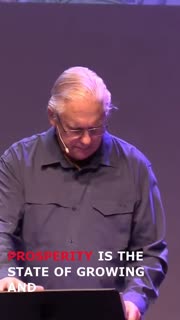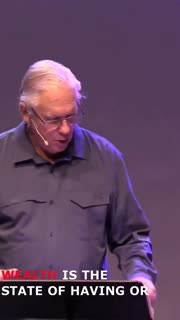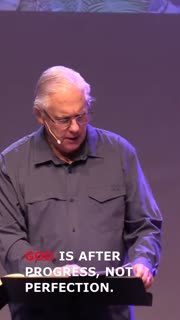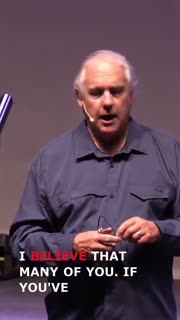Biblical Principles for Financial Prosperity and Wisdom
Devotional
Sermon Summary
Bible Study Guide
Sermon Clips
1. "Prosperity is the state of growing and flourishing body, soul, and spirit. It's being in a state of fulfillment, of peace, of inner riches. Reality is that there's more conflict over money in a marriage than anything else. Prosperity is when you are emotionally stable in yourself and with others. In financial terms, prosperity is when you have enough money to pay your debts, your rent, your mortgage, you have enough money for food and so forth." [03:01] (46 seconds)
2. "It is clearly God's will and pattern for us for all to be prosperous and ultimately for all of us to be wealthy for more than just personal pleasure. So prosperity is about both financial stability, but listen, it is also about emotional stability and there is certainly a link biblically between our emotional health, and our money." [04:00] (60 seconds)
3. "We are not prosperous and we're not wealthy because we don't know how money works. So let me read the statement. If you fully understand how money works and how to work with money, riches, wealth, and ultimately righteousness, which is your spiritual life, will be changed and strengthened. There is a direct correlation between money and your spiritual well-being." [09:07] (27 seconds)
4. "To put this into perspective, did you know that there are 2,350 verses in the Bible concerning money? There is almost twice as many as verses about faith and prayer combined. Jesus had a lot to say about money. Nearly 15% of everything that Jesus spoke about related to money and possessions. 16 out of the 38 parables dealt with the topic of money. The only subject that Jesus taught more about than money was the kingdom of God." [10:23] (47 seconds)
5. "God is after progress, not perfection. Did you get that? He's after progress. He's after success, not perfection. God multiplies. Listen to this. And John Cameron will speak about this, especially next week. God multiplies on the steps that we take. There are people who are praying for God to do miracles and they're not doing the right things for God to bless them. And then they wonder why God's not blessing them. It's because you don't know how money works." [16:03] (39 seconds)
6. "The moment we align our lives with God's purpose and take steps toward it. God gets involved and abundantly blesses our lives. We are now going to watch 20 minutes of John Cameron. Thank you. Can you get rid of this, please? Wow." [16:49] (60 seconds)
7. "I believe that many of you. If you've not lost jobs. May potentially lose jobs for whatever reason. And so this is all about preparing us. Preparing you and I. To be in a place of safety. Security. Even in troubled times. So that we might be prosperous." [39:55] (23 seconds)
8. "God wants us to be. Prosperous. And so father I just pray that. Each one of us would examine our hearts. We will deal with any. Attitudes. Lord that have come against money. And have bad attitudes toward money. Whatever it doesn't matter. It's to do with individuals. But Lord speak to us. So that we come next week. Ready to listen. To the next four points of the first message. Of John's." [41:33] (29 seconds)
Ask a question about this sermon
2. "It is clearly God's will and pattern for us for all to be prosperous and ultimately for all of us to be wealthy for more than just personal pleasure. So prosperity is about both financial stability, but listen, it is also about emotional stability and there is certainly a link biblically between our emotional health, and our money." [04:00] (60 seconds)
3. "We are not prosperous and we're not wealthy because we don't know how money works. So let me read the statement. If you fully understand how money works and how to work with money, riches, wealth, and ultimately righteousness, which is your spiritual life, will be changed and strengthened. There is a direct correlation between money and your spiritual well-being." [09:07] (27 seconds)
4. "To put this into perspective, did you know that there are 2,350 verses in the Bible concerning money? There is almost twice as many as verses about faith and prayer combined. Jesus had a lot to say about money. Nearly 15% of everything that Jesus spoke about related to money and possessions. 16 out of the 38 parables dealt with the topic of money. The only subject that Jesus taught more about than money was the kingdom of God." [10:23] (47 seconds)
5. "God is after progress, not perfection. Did you get that? He's after progress. He's after success, not perfection. God multiplies. Listen to this. And John Cameron will speak about this, especially next week. God multiplies on the steps that we take. There are people who are praying for God to do miracles and they're not doing the right things for God to bless them. And then they wonder why God's not blessing them. It's because you don't know how money works." [16:03] (39 seconds)
6. "The moment we align our lives with God's purpose and take steps toward it. God gets involved and abundantly blesses our lives. We are now going to watch 20 minutes of John Cameron. Thank you. Can you get rid of this, please? Wow." [16:49] (60 seconds)
7. "I believe that many of you. If you've not lost jobs. May potentially lose jobs for whatever reason. And so this is all about preparing us. Preparing you and I. To be in a place of safety. Security. Even in troubled times. So that we might be prosperous." [39:55] (23 seconds)
8. "God wants us to be. Prosperous. And so father I just pray that. Each one of us would examine our hearts. We will deal with any. Attitudes. Lord that have come against money. And have bad attitudes toward money. Whatever it doesn't matter. It's to do with individuals. But Lord speak to us. So that we come next week. Ready to listen. To the next four points of the first message. Of John's." [41:33] (29 seconds)








